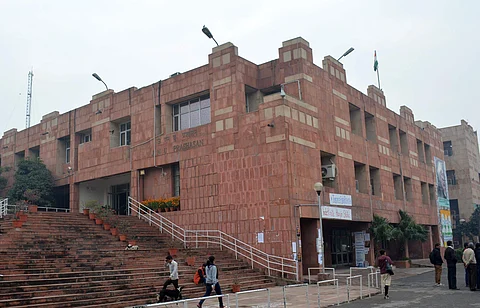

A committee for processing leave applications has been constituted at the Jawaharlal Nehru University (JNU). This comes after the decision taken by the varsity's Executive Council in its 300th meeting on May 5 to direct the Vice-Chancellor, Dr Santishree Pandit to constitute the committee.
While the Vice-Chancellor, in a statement to Edexlive, has said that the committee will make the process of clearing long leaves for faculty more democratic, the JNU Teachers' Association (JNUTA) has written a letter to the VC, advising her to dissolve the committee.
What is this committee supposed to do? Well, as of now, any applications for sabbatical or long leaves, usually taken by professors to pursue research work, are first approved by their respective department's Chairperson or Dean, and are then sent to the Executive Council for final deliberation and approval. According to the JNUTA, these leaves are planned by the faculty members well in advance in order to chart out schedules that coordinate well with that of their colleagues and do not hamper the education of the students either. The JNUTA contends that the leave committee's addition will render these plans astray and cause real problems, especially for women faculty, who, in some cases, might take longer to plan their sabbaticals.
The leaves approved by the heads of departments will now go to the leave committee that will either clear the leaves for the VC's signature or will forward it to the Executive Council for further deliberation. It is essentially an added layer of scrutiny on leave applications submitted by the faculty.
Eight leave applications had already been submitted to the Executive Council for approval during its most recent meeting. However, the Council decided to direct these to the committee, which hadn't been formed at the time. The JNUTA has said that this jeopardises the plans made by the teachers and makes the leave application process worrisome and perplexing.
The JNUTA has questioned the need for such a committee in the first place, when it says that procedures in place for leave approval were already robust. Additionally, the teachers also claim that the committee goes against the UGC regulations of 2018 and violates other statutes of the university. By adding another layer for approval, the teachers believe that the authority of schools and centres of the varsity is being subverted and the statutory powers vested with the Executive Council are also being undermined, since ordinances issued in the past by the university say that the decision to clear sabbatical leaves are vested with the EC.
"The introduction of an additional and unwarranted stage of scrutiny in the process can only contribute to uncertainty and delay rather than streamlining of the process," said the letter by JNUTA. They claim that out of the eight faculty members whose leave applications were redirected from the EC to the leave committee, two of them have been asked to submit a two-page synopsis of their intended research. JNUTA claims that this is arbitrary and a denial of due process for these "colleagues".
The committee consists of one member from the School of Computer and System Sciences, one member from the School of Language Literature and Culture Studies, one member from the School of Physical Sciences and a Member Secretary from the Academic Branch. However the tenure of this committee and an exact list of its responsibilities has not been defined, claims the JNUTA.
Keeping these concerns on the table, the JNUTA has asked for a personal intervention from the Vice-Chancellor in the matter. They have requested the leave committee be dissolved, and an emergency meeting of the EC be called in order to address the leave applications of the eight faculty members.
